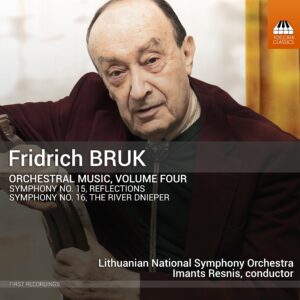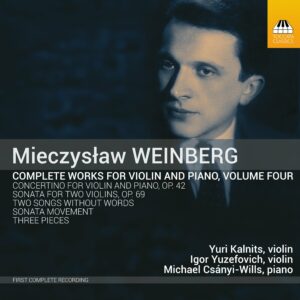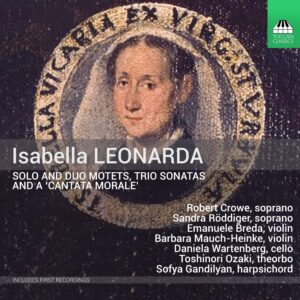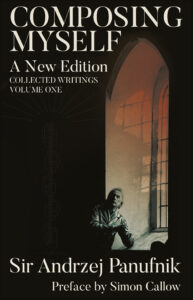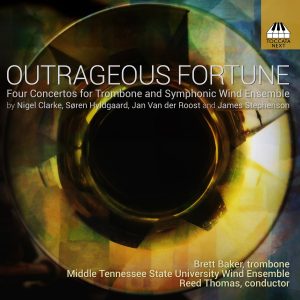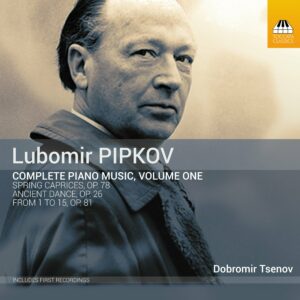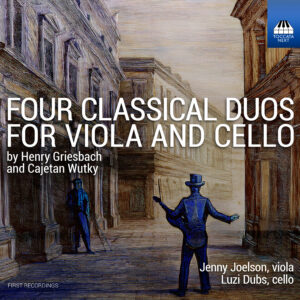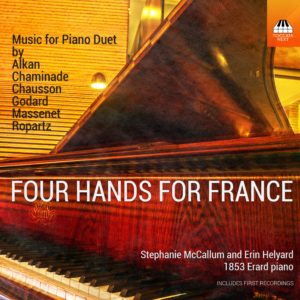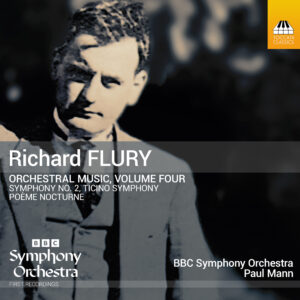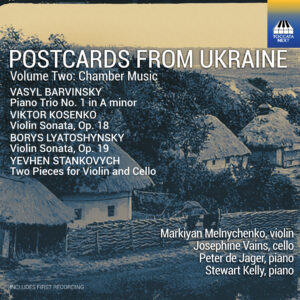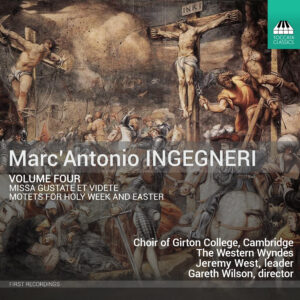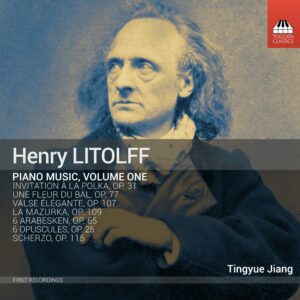Search Results for "fantastic four first steps online free 123movies" – Page 3
Showing results for fantastic four first steps online free movies movies
Fridrich Bruk: Orchestral Music, Volume Four
This fourth instalment of the recent symphonic output of Fridrich Bruk (born in Ukraine in 1937 but a Finnish resident since 1974) brings two earlier works – from when Bruk was merely in his late seventies. His Symphonies Nos. 15 and 16 – both predicated on Bruk’s concern for the environment – inhabit the sound-world that has become familiar from his more recent symphonies: almost a stream of consciousness expressed through wildly inventive orchestral writing in a kaleidoscope of colour and counterpoint, sitting somewhere between Villa-Lobos and Pettersson in its profligate abundance.
Lithuanian National Symphony Orchestra
Imants Resnis, conductor
Livia Teodorescu-Ciocănea: Orchestral Music
These three works by the Romanian composer Livia Teodorescu-Ciocănea (b. 1959) show her approach to three of the central genres of the western classical tradition: symphony, concerto and cantata. The powerful and programmatic Archimedes Symphony was inspired by the death of Archimedes in the siege of Syracuse in 214 BC; the Rite for Enchanting the Air – a concerto for various flutes and orchestra – is a kind of magical journey into a dizzying world of sound and colour; and the cantata Mysterium tremendum aims to reconcile Byzantine and Catholic liturgical traditions. All three make clear her fascination with orchestral timbre and texture – and have distant roots in Romanian folk-music.
Pierre-Yves Artaud, flutes (Tracks 5–8
Antonela Barnat, mezzo-soprano (Tracks 9–12)
Romanian Radio National Orchestra (Tracks 1–8)
Radio Romania Chamber Orchestra (Tracks 9–12)
Valentin Doni (Tracks 1–4)
Alan Tongue (Tracks 5–8)
Cristian Oroșanu (Tracks 9–12), conductors
Mieczysław Weinberg: Complete Works for Violin and Piano, Volume Four
In the past twenty years the Polish-born, Moscow-based Mieczysław Weinberg (1919–96) has been recognised as one of the major voices in twentieth-century music, equivalent in stature to his close friend Dmitry Shostakovich. This fourth and final volume of his music for solo violin, violin and piano and two violins completes the only survey to take all of these works into account. It presents music ranging from a startingly assured early score by the teenage Weinberg to works in which his personality is fully established and instantly recognisable.
Yuri Kalnits, violin
Igor Yuzefovich, violin (10–12)
Michael Csányi-Wills, piano (1–9)
Isabella Leonarda: Solo and Duo Motets, Trio Sonatas and a ‘Cantata Morale’
Isabella Leonarda (1620–1704) was a remarkable woman. At a time when female composers were a rarity, she was both prominent and prolific. Although she was cloistered (literally: she was a nun) in Novara in northern Italy, the dedications of her published compositions show her to have been extremely well connected. And her music demonstrates that she was well aware of the music of contemporaries like Carissimi and Corelli. These facts would be of merely historical importance, were her music not so engaging: although most of the works recorded here are devotional, they are full of buoyant rhythms, colourful textures and a surprisingly dramatic approach to the texts she was setting – many probably written by Leonarda herself.
Robert Crowe, soprano (Tracks 1, 9, 19, 31)
Sandra Röddiger, soprano (Tracks 9, 10, 24, 31)
Emanuele Breda, violin
Sofya Gandilyan, harpsichord
Barbara Mauch-Heinke, violin
Daniela Wartenberg, cello
Toshinori Ozaki, theorbo
Paul Juon: Chamber Music for Viola
Paul Juon was born in Moscow, of Swiss parents, in 1872, studying there with Arensky and Taneyev; Rachmaninov, a fellow student at the Moscow Conservatoire, dubbed him ‘the Russian Brahms’. Woldemar Bargiel, Clara Schumann’s half-brother, was his main teacher at the Hochschule für Musik in Berlin before Juon himself became a member of the staff. There are indeed echoes of Brahms in Juon’s early music but there is also a fondness for Russian folksong and a mastery of counterpoint, which all feed into his urgent, late-Romantic lyricism.
Basil Vendryes, viola
Igor Pikayzen, violin (Tracks 8–18)
William David, piano
Andrzej Panufnik: Composing Myself
Preface by Simon Callow
Extent: 478 pages
20 colour & 80 b/w illustrations
Hardback
Heinrich Sutermeister: Orchestral Works, Volume Two
Heinrich Sutermeister (1910–95) belongs to the generation of Swiss composers after Bloch, Honegger, Martin and Schoeck. His operatic version of Romeo and Juliet soon spread his reputation far afield, and conductors as prominent as Böhm, Karajan and Sawallisch championed his works, although since his death his music has not had the attention it deserves. These four big-boned works – a powerful setting of Boethius, an extract from Romeo und Julia and two sets of moving love-letters from genuine historical figures in Renaissance, Baroque and Enlightenment Germany and Switzerland – attest to the acuity of his ear in balancing voice and large orchestra and confirm his instinct for drama.
Juliane Banse, soprano (1–9, 17–22)
Benjamin Bruns, tenor (10–16)
Deutsche Staatsphilharmonie Rheinland-Pfalz
Rainer Held, conductor
Outrageous Fortune: Four Concertos for Trombone and Winds
This unusual album shows the contemporary trombone in a rich variety of guises – dramatic, lyrical, flirtatious, solemn, capricious and many more – in four recent concertante pieces for trombone and symphonic wind band, demonstrating the striking versatility of the instrument. It’s an international undertaking, too: the soloist is English, the band and conductor American, and the composers American, Danish, Belgian and English, all four writing in a language that is direct and immediate.
Brett Baker, trombone
Natalie Grady, voice actor (Tracks 5, 6)
Middle Tennessee State University Wind Ensemble
Reed Thomas, conductor
Lubomir Pipkov: Complete Piano Music, Volume One
Lubomir Pipkov (1904–74) was one of the leading members of the so-called ‘second generation’ of Bulgarian composers. In later life he became fascinated with the ancient heritage of Bulgarian folk-music, writing a series of what he called ‘metro-rhythmical studies’ – piano miniatures that combine melodic immediacy and rhythmic complexity, with a character that might be loosely characterised as sounding like ‘Prokofiev in the Balkans’.
Dobromir Tsenov, piano
Four Classical Duos for Viola and Cello
For the past two centuries or so, making music has largely been a public business, with paying audiences listening to professional musicians. But for most of western history, outside of formal and religious occasions and local festivities, music-making was largely a domestic affair, with individuals playing for their own pleasure. Most of the music written for the drawing room has long been lost from sight, and its composers forgotten, the two heard here – the Austrian Cajetan Wutky and German-English John Henry (né Justus Heinrich) Griesbach – being cases in point. Their Haydnesque string duos, only recently rescued from obscurity in modern publications, hint at the pleasure their first patrons would have found in performing them.
Jenny Joelson, viola
Luzi Dubs, cello
Four Hands for France: Music for Piano Duet
Playing four-hands piano was both vital in the dissemination of music in the nineteenth century and also a popular domestic activity. The French composers recorded here span the Romantic century, from the salon charm of Chaminade and Massenet and the virtuosity of Alkan’s wild dance to the innocence of the family music-room in pieces by Chausson, Godard and Ropartz. The original 1853 Parisian Erard piano on which this recording was made combines warmth with bell-like clarity due to its straight stringing, allowing it to produce a surprising variety of appealing, expressive textures.
Stephanie McCallum (primo) and Erin Helyard (secondo)
Piano Erard 1853
Richard Flury: Orchestral Music, Volume Four
The Second Symphony of the Swiss composer Richard Flury (1896–1967) is deeply bound up with his personal life. In 1932 his first marriage broke up, and his wife and four children left Solothurn in the north to settle in Ticino, in the south. Through visits to his family in Lugano Flury grew to know the area well, so much so that he decided to celebrate their new surroundings in his Second Symphony, the movements of which are based on the carillon of the Flury family’s local church and three Ticino folksongs. Structurally, the work belongs to the Brucknerian tradition, but it also has points of contact with the orchestral naturepainting of Flury’s good friend Joseph Marx. The landscape of the Poème nocturne is an interior one: it is an expansive dreamfantasy of occasionally violent passions, a worthy cousin of Richard Strauss’ tonepoems.
BBC Symphony Orchestra
Paul Mann, conductor
José F. Vásquez: The Complete Impresiones for Piano
José F. Vásquez (1896‒1961) – composer, pianist, conductor and educationalist – was one of the leading figures in Mexican classical music from the 1910s to the 1950s, but since many of his scores were lost after his death, his star soon sank from the sky. Four decades of research by his son, the writer José Jesús Vásquez Torres, have recovered much of the missing music, allowing a re-assessment of his father’s standing. These five books of Impresiones for piano (from c. 1922‒27) – fifteen predominantly slow, introspective miniatures – reveal a debt to French Impressionism, Debussy in particular, with occasional nods to Schumann, Liszt and Brahms, and some harmonies that suggest Wagner. Vásquez was a fine pianist himself, but the textures here have a surprising simplicity, throwing the emphasis on tonal colour.
Vladimir Curiel, piano
Postcards from Ukraine, Volume Two: Chamber Music
The first album of Postcards from Ukraine gave a potted history of Ukrainian music in the form of a series of miniatures for piano and violin. In this second instalment four representative chamber works demonstrate how quickly music in Ukraine developed its own identity – although all four composers here had to contend with repression by the authoritarian regime to the north. One of them, Vasyl Barvinsky, even spent ten years in the Gulag, with his manuscripts destroyed by the Soviet authorities. Upon his release, unbowed, he set about reconstructing those lost scores, though he died before he could complete the task. His glorious A minor Piano Trio gives an indication of what was nearly lost – and how much remains to be discovered.
Markiyan Melnychenko, violin
Josephine Vains, cello
Peter de Jager, piano
Stewart Kelly, piano
Marc’Antonio Ingegneri: Volume Four – Missa Gustate et videte; Motets for Holy Week and Easter
The Cremonese composer Marc’Antonio Ingegneri (c. 1535/36–92) is chiefly remembered as the teacher of Claudio Monteverdi while, for well-nigh 500 years, his own achievements were left to sit in the shadows. This fourth in a series of pioneering recordings from the Choir of Girton College, Cambridge, presents a sequence of music for Holy Week and Easter, confirming Ingegneri to have been one of the masters of his age. The striking range of moods heard here will confound conventional expectations of Renaissance polyphony: Ingegneri’s emotional palette extends from tender intimacy in some of these motets to dancing, celebratory jubilation in the Mass setting – all of it music of breathtaking richness and beauty.
Choir of Girton College, Cambridge
The Western Wyndes
Jeremy West, leader
Gareth Wilson, director
Henry Litolff: Piano Music, Volume One
The British-born Henry Litolff (1818–91) maintains a toehold on the repertoire thanks to the enduring popularity of the Scherzo of his Concerto symphonique No. 4 for piano and orchestra. Litolff’s substantial output of music for solo piano – mostly virtuoso salon miniatures – has entirely slipped from sight, even though in his prime as composer and pianist he was often compared with Liszt, a personal friend. This first album devoted to Litolff’s piano music reveals a fondness for atmospheric character pieces and vigorous dances, not least the polka, mazurka and waltz.
Tingyue Jiang, piano
Stay In the Know
JOIN THE TOCCATA NEWSLETTER
"*" indicates required fields
By visiting our site, you agree to our privacy policy regarding cookies, tracking statistics, etc.
